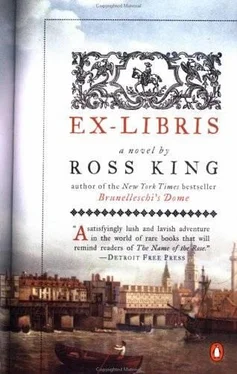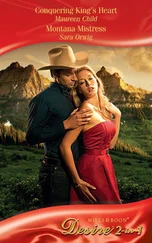As I closed the hide cover, I remembered from somewhere that Agrippa, the so-called 'Prince of Magicians', a friend of both Erasmus and Melancthon, a secretary to the Emperor Maximilian and a physician and astrologer at the court of François I, was said to be the foremost authority in Europe on the Hermetic writings. Even so, the link between his Magische Werke and the Hermetic parchment stolen from Pontifex Hall promised to be a long and tortuous one. Authentic Schwarziana or not, the volume might have no connection whatsoever with either Sir Ambrose or his missing parchment. Had I merely wasted five pounds and an entire day's work?
Perhaps not. I fished in my pocket for the card Pickvance had given me after I had threaded my way to the front of the room to collect my prize. Up close, the auctioneer had been shorter and looked much older. Deep creases criss-crossed his consumptive face, and the whites of his eyes-or, rather, their yellows-were filigreed with red. His long fingers were, as I had noticed, strangely crooked, as if arthritic or even, perhaps, broken by a pilliwinks. I wondered if he had been tortured by one of Cromwell's Secretaries of State, or if his hands had merely been caught in a falling sash-window. As I accepted the copy of Agrippa from these gruesome claws I found myself bold enough to ask who had put the volume up for auction.
'I might be interested in other texts of a similar provenance,' I told him in a low tone. 'Ones from von Steiner's collection.'
Pickvance had seemed startled by the question. It occurred to me, not for the first time, that the volume might have been stolen: yet another reason why he chose to auction his wares in the Golden Horn. Possibly his inventory-those lots that weren't forged-consisted entirely of booty from the libraries of Royalist estates that, like Pontifex Hall, had been pillaged or confiscated. His reply did nothing to alleviate my suspicions. He shrugged and told me that he was 'not at liberty to divulge' his sources. His emaciated face had stretched into an unwholesome grin.
'Trade secrets, after all.'
I caught him by the coat-sleeve as he was turning away to attend to someone else. I suspected the jangle of a few gold sovereigns could easily put paid to what few scruples or discretions he might possess, so I told him in the same hushed tone that my client would be willing to pay a great deal-much more than five pounds-for the right volume. He had paused at that, then turned slowly to face me. For a second I wondered whether I was doing the right thing… and whether Pickvance was anything more than a thief or a charlatan. Whatever, he seemed to set aside his own reservations at once and rise eagerly to the bait.
'Oh, I dare say. Oh, it's possible, yes, that I might have something in that line.' His tone was more respectful now. He was probably inventing plans for more 'Schwarziana' as he spoke, more forged texts. 'Of course, I would have to check my catalogues. But, yes, yes, yes, I may well have-'
Now it had been my turn to leap to the bait. 'You keep catalogues? Records of your sales?'
He seemed insulted by the question. 'Why, yes. Of course I do.'
'Yes, of course.' I pressed on, polite and earnest as ever. Would it be possible, I wonder, for me to consult-'
But I was interrupted by a shout from behind us. The Cavaliers and Bunhill Brethren had begun pressing forward to claim their unsavoury acquisitions, and Mr. Skipper, anxious to requite them, was attempting to draw Pickvance aside. The auctioneer muttered something into his cravat, then turned back to me, fishing inside his waistcoat with his dreadful, pilliwinksed fingers.
'Tomorrow,' he whispered to me before a wave of bodies carried him off.
Now, looking down at the card, I realised that when I went to Pulteney House the next evening I would at least have something to report to Alethea-something of importance, if my appointment with Pickvance proved fruitful. I had no idea what, if anything, might be found in one of his catalogues. Lists of buyers and sellers, perhaps, or the name of whoever had put the edition of Agrippa up for auction. Possibly even a reference, a trail of sorts, that would lead to the parchment, or at least back to Sir Ambrose's library and whoever had pillaged it. Because whoever pillaged it might have sold the books-stolen books, after all-through an unscrupulous dealer such as Pickvance.
I started back towards the Golden Horn, into which a few customers were filtering. It was still early, I guessed: not yet five o'clock. With a pang of guilt, not to mention surprise, I realised I didn't want to return to Nonsuch House; not just yet. Perhaps I would walk back to the bridge, a leisurely stroll. It had turned out to be a fine day, even here in Alsatia. The stench of the Fleet Ditch wasn't so bad, I decided, once one got used to it. The wind had strengthened, dispersing the shimmering miasma and the clouds of insects. It had also borne up a few clouds that dragged themselves slowly overhead, bound for points east. Perhaps I would stop in a tavern on the way, I thought, or a coffee-house.
I tucked the Magische Werke back inside my coat-tails and then looked again, as if for guidance, at the slip of paper in my hand. An ordinary tradesman's card incorporating a coat of arms-no doubt fraudulent-and four lines of text, neatly engraved:
Dr. Samuel Pickvance,
Bookseller & Auctioneer,
at the Sign of the Saracen's Head,
Arrowsmith Court, Whitefriars
I would be making at least one more trip into Alsatia; but for the first time the prospect didn't fill me with dread. Nor, I realised, did the prospect of visiting Lincoln's Inn Fields. Alethea's face suddenly rose before me, alarmingly distinct, and I realised also that I was almost looking forward to the appointment. And so as I travelled home along Fleet Street, where I did indeed stop inside a tavern, I wondered what was happening to me. I was becoming bold and unpredictable, a stranger to myself: as if one of Agrippa von Nettesheim's alchemical reactions, some profound and alarming transmutation, had taken place deep inside me.
Pulteney House stood on the north side of Lincoln's Inn Fields, halfway along a terrace of six or seven houses, all perfect replicas of one another, that overlooked the field: brick façades, white pilasters, tall windows reflecting a score of suns. I approached it along one of the dozen public footpaths through the overgrowth of pimpernel and cudweed. It was late afternoon, and I was sweating heavily after a long walk. My legs were faltering and my shirt clung to my back. I shaded my eyes from the lowering sun and looked about me.
Lincoln's Inn Fields had once been London's most fashionable quarter, a place where our lords and ladies-members of Charles I's doomed court-had lived in their insolent and audacious luxury. But during the Commonwealth they made haste for Holland or France, and so for the past ten years most of the houses had stood deserted. Now there was no smoke and no light, and as I drew closer I could see their blistered paint, a broken window here or there, the layers of soot on their sills and ovolos. The wrought-iron railings and gates about their gardens-rank with couchgrass-had been uprooted. Turned into Cromwell's muskets and cannons, I supposed.
Pulteney House was, marginally, in the best repair, with a young mulberry standing guard at the door and the polished panes of a window showing oriflammes of sunlight. The heavy fold of a gold-tasselled curtain was barely visible behind them. I didn't recall Alethea saying that either Sir Ambrose or Lord Marchamont had owned a London house, so as I manipulated the ponderous lion's-paw knocker I came to the distressing conclusion that Pulteney House must belong to Sir Richard Overstreet, the man to whom, according to Phineas Greenleaf, Lady Marchamont was betrothed. The 'matters of some importance' no doubt had something to do with plans for the wedding.
Читать дальше












